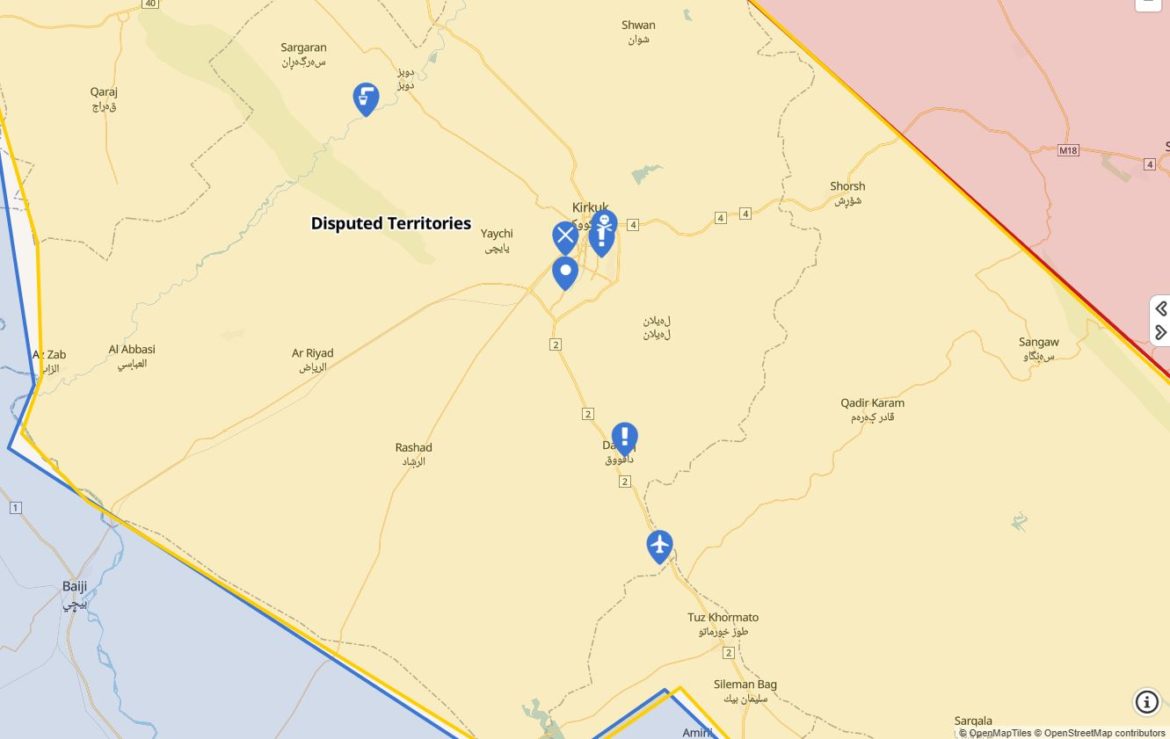854
Kirkuk
- On April 14, elements of the Iranian-backed Popular Mobilization Units (PMU) and Shitte politicians celebrated “Jerusalem Day” in the Khathra neighborhood, holding a large ceremony where they laid American and Israeli flags on the streets. The militias raised posters of the deceased Iraqi militia leader Abu Mahdi al Muhandis and the Iranian general killed by the US, Qasim al Solemani. The crowd hung pictures of Iranian supreme leader Ali al Khamenei and several other militia leaders. Since October 16, 2017; the PMU have been de facto security rulers in Kirkuk.
- A Kurdish lawmaker announced the increase of the Article 140 budget to 100 billion Iraqi dinars from a previous allocation of 50 billion. The Article 140 budget includes compensating the Kurds displaced from the disputed territories by the former Iraqi regime. The lawmaker also announced that the joint Peshmerga and Iraqi forces budget had been allocated for 3,777 ranks. For more than a year, Baghdad and Erbil agreed to form a new joint force to fill the security vacuum in the disputed territories, but the force couldn’t be raised due to budget issues.
- On April 12, five Shiite and Sunni Arab parties formed a joint coalition to participate in the upcoming Kirkuk provincial council elections. The five parties consisted of the Arab Coalition in Kirkuk, the Azem Coalition, the Arab Council, the Kirkuk Opinion Committee, and the Rule of Law Coalition. On April 13, the acting governor Rakan al Jabouri, leader of the Arab coalition, rejected the agreement and said, “We have not made any agreement to form a coalition, and the presence of the representative of the Arab coalition was there to express our views” adding that the meeting was “only consultative on the issue of forming a unified Arab coalition.”
- On April 17, the Iraqi Integrity Commission announced the arrest of six employees in the tax office for “bribes” and processing of paperwork illegally. In a statement, the Commission said documents were confiscated during their arrest. Separately, the security forces arrested family members, including the wife and brother, of the former director of the Sunni endowment Saad Kambish. The arrest came after Kambish fled his prison in Baghdad and later died during his arrest in Mosul. Kambash was sentenced to four years in prison for corruption.
- On April 18, the security media cell reported that airstrikes bombed a detachment of Da’esh terrorists in Rukhana Valley based on “information and precise follow-up by the directorate of military intelligence.” The air raid killed four terrorists and destroyed the hideout. A day after the raid, the Defense Minister visited Hawija district as Da’esh counties to pose threats. Separately, the Kirkuk police clashed with a terrorist attempting to plant an IED in the Kurdish neighborhood of Panja Ali. One police officer was wounded, but the IED was defused.
- On April 15, the State Organization for Marketing of Oil (SOMO) announced that oil exports from Kirkuk fields to Jordan had been suspended. According to a statement issued by SOMO, the agreement between Jordan and Iraq to sell Kirkuk oil which was renewed two years ago expired on 31/3/2023. At the request of Jordan, the Council of Ministers approved the renewal of the agreement on March 28, and the agreement will be signed between the two countries soon. The Iraqi government has been selling Kirkuk oil to Jordan at $16 less than the world market price to meet its domestic needs. New agreement between Baghdad and Amman to export oil to Jordan is expected to be signed within the next two weeks.
Shingal (Sinjar)
- On April 20, Fahad Hamid, the acting mayor of the Shingal district, announced his resignation in a press conference. Hamed praised the security situation in Shingal in the past six months and said he is “tired” after six years of being the acting mayor. Since October 16, 2017, Hamed has become a middle-ground candidate between Erbil and Baghdad. Hamed expressed his frustration about the issues in the Shingal district and said, “the problems of Sinjar have remained unchanged for several years, and there is no bright prospect for resolving them.”

